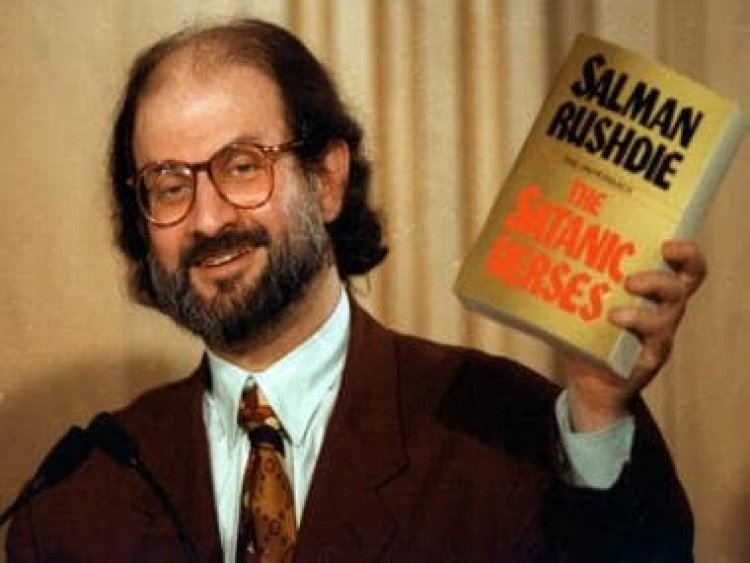'Rajiv Gandhi banned my book because of Muslim votes', Rushdie had said in a 1998 letter
'Rajiv Gandhi banned my book because of Muslim votes', Rushdie had said in a 1998 letter

New Delhi: Following the controversy over British author Salman Rushdie's book Satanic Verse soon after its publication in September 1988 and the fatwa issued in Iran, India, at that time under Congress rule with Rajiv Gandhi as the prime minister, banned the novel's importation in October.
Following the ban, which did not render The Satanic Verses as proscribed literature, Rushdie wrote an open letter to Rajiv Gandhi in 1988 protesting against it. The letter, which appeared in New York Times titled 'Indian bans a book for its own good', dated 19 October 1998, he wrote:
"Dear Rajiv Gandhi on Oct 5 the Indian finance ministry announced the banning of my novel, "The Satanic Verses," under Section 11 of the Indian Customs Act. Many people around the world will find it strange that it is the finance ministry that gets to decide what Indian readers may or may not read. But let that pass, because at the end of the notification of the ban an even stranger statement appeared.
The ministry — I am quoting from The Press Trust of India's report — "added that the ban did not detract from the literary and artistic merit of Rushdie's work." To which I can only reply: Thanks for the good review. The book was banned after representations by two or three Muslim politicians, including Syed Shahabuddin and Khurshid Alam Khan, both members of Parliament. These persons, whom I do not hesitate to call extremists, even fundamentalists, have attacked me and my novel while stating that they had no need actually to read it. That the Government should have given in to such fires is profoundly disturbing.
A further official statement was brought to my notice. This explained that "The Satanic Verses" had been banned as a pre-emptive measure. Certain passages had been identified as susceptible to distortion and misuse, presumably by unscrupulous religious fanatics and such. The banning order had been issued to prevent this misuse. Apparently, my book is not deemed blasphemous or objectionable in itself, but is being proscribed for, so to speak, its own good.
This really is astounding. It is as though, having identified an innocent person as a likely target for assault by muggers or rapists, you were to put that person in jail for protection. This is no way, Mr. Gandhi, for a free society to behave.
Clearly, your Government is feeling a little ashamed of itself and, sir, it has much to be ashamed about. It is not for nothing that just about every leading Indian newspaper and magazine has deplored the ban as, for example, "a Philistine decision" (The Hindu) or "thought control" (Indian Express).
It is not for nothing that such eminent writers as Kingsley Amis, Ha old Pinter and Tom Stoppard have joined International PEN and India's association of publishers and book sellers in condemning the decision. The right to freedom of expression is at the foundation of any democratic society, and at present, all over the world, Indian democracy is becoming something of a laughing-stock.
When Syed Shahabuddin and his fellow self-appointed guardians of Muslim sensibilities say that "no civilized society" should permit the publication of a book like mine, they have got things backwards. The question raised by the book's banning is precisely whether India, by behaving in this fashion, can any more lay claim to the title of a civilized society....
Can the finance ministry really be saying that it is no longer permissible, in modern, supposedly secular India, for literature to treat such themes? If so, things are more serious than I had believed. From where I sit, Mr. Gandhi, it looks very much as if your Government has become unable or unwilling to resist pressure from more or less any extremist religlous grouping; that, in short, it's the fundamentalists who now control the political agenda.
You know, as I know, that Mr Shahabuddin, Mr Khurshid Alam Khan and their allies don't really care about my novel. The real issue is the Muslim vote.
I deeply resent my book being used as a political football; what should matter to you more than my resentment is that you come out of this looking not only Philistine and anti-democratic but opportunistic.
Mr. Prime Minister, I can't bring myself to address finance ministries about literature. In my view, this is now a matter between you and me. I ask you this question: What sort of India do you wish to govern? Is it to be an open or a repressive society?
Your action in the matter of "The Satanic Verses" will be an important indicator for many people around the world. If you confirm the ban, I'm afraid I, and many others, will have to assume the worst. If, on the other hand, you should admit your Government's error and move swiftly to correct it, I will be the first to applaud your honorable deed.
The Congress government even imposed a travel ban on Salman Rushdie, barring him from coming to India. The ban was eventually lifted by the Vajpayee government in 1999.
With inputs from New York Times
Read all the Latest News, Trending News, Cricket News, Bollywood News,
India News and Entertainment News here. Follow us on Facebook, Twitter and Instagram.
What's Your Reaction?



























































